5 gender pay gap statistics from the Lifepoints community

Currently, in the UK, the gender pay gap is 8.3%. This means that men earn 8.3% more than women on average.
The gender pay gap has several factors to it that are constantly changing, so we decided to see what the LifePoints community thinks about the topic. We asked our community a series of questions including topics such as societal progress over time, available opportunities for women and the representation of women in leadership roles.
The community was quick to share their opinions, and we’re happy that you can now see them. Read on to learn more about the gender pay gap, see how LifePoints members view the issues and celebrate some of the most successful women in the UK.
Basic questions about the gender pay gap
What is the gender pay gap?
The gender pay gap is the difference between how much women make compared to the men in the UK. There are a lot of moving parts which contribute to this gap, but the government defines the gender pay gap as “the difference between average (median) hourly earnings of men and women, usually shown by the percentage men earn more than women.”
How to calculate the gender pay gap
To calculate the gender pay gap, find the salary of every woman in the UK, line them up, and see which salary falls in the middle. The same is then done for men and the two numbers are compared to get the gender pay gap.
Why is there a gender pay gap?
There are a lot of reasons why there is a gender pay gap in the UK, including:
- Women might choose types of jobs that pay less
- Women being offered less money when being hired
- Women taking time off work to raise families
- Fewer women in senior leadership roles to create initiatives to close the pay gap
- Men are more likely to negotiate a higher salary
This is only a snippet of what causes the gender pay gap. To read more, read the Office for National Statistic’s gender pay gap report.
Why is the equal pay act?
There have been two equal pay acts, one in 1970 and one in 2010.
The equal pay act of 1970 allows someone to claim equal pay, if they feel someone of the opposite sex is being paid more for the same work.
The equal pay act of 2010 takes the 1970 act one step further and requires all employers to pay people equally for equal work, unless they can justify the differences in the work.
5 stats that show what people think about the pay gap
LifePoints community members were asked what they think about the gender pay gap, and over 600 people shared their opinion. Here’s what they believe:
People are unsure if some jobs are made for men and some are made for women
One of the questions that split the community is whether some jobs are made for men, and some are made for women. The most common response was yes with 40.7% of people agreeing. The least common response was ‘no’ with 28.6%, and 30.7% of people said some jobs were made for men and some were made for women.
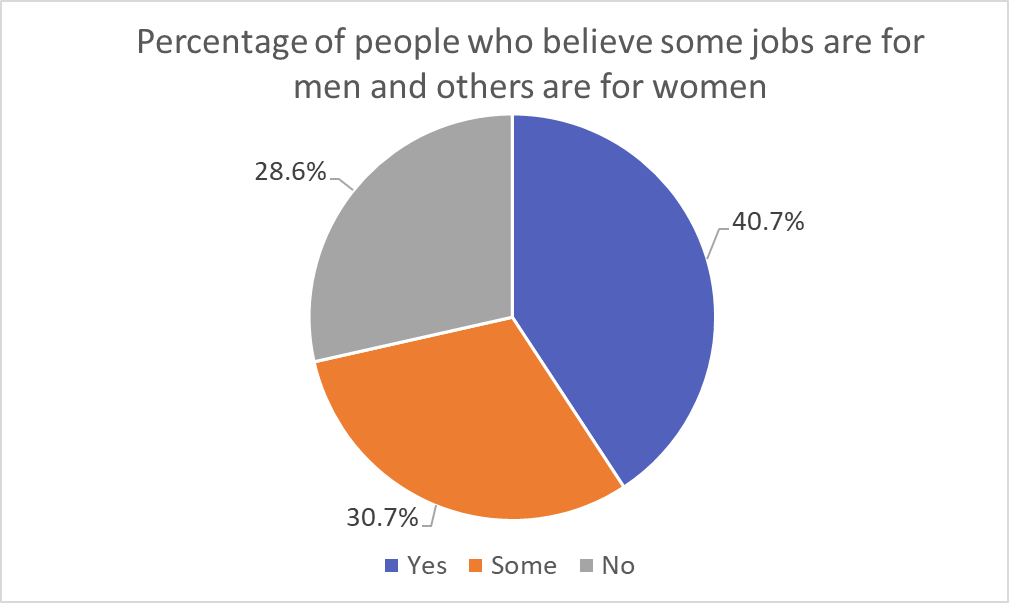
Women are less likely to believe that men and women are offered the same opportunities in their careers
LifePoints community members were asked if they believe that people were offered the same career opportunities. More men believed that people are offered the same opportunities with 75.2% of men saying yes, while only 53.9% percent of women said yes.
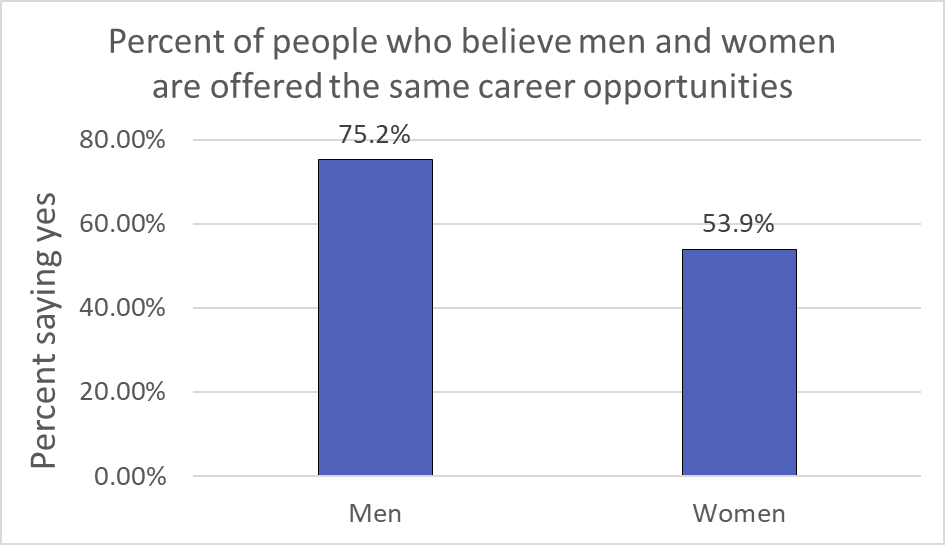
As a whole, LifePoints community believes that there needs to be more women in leadership positions
People are more likely to believe that there aren’t enough women leaders in the world, but this was a slim margin with 52% of people saying there aren’t enough women leaders.
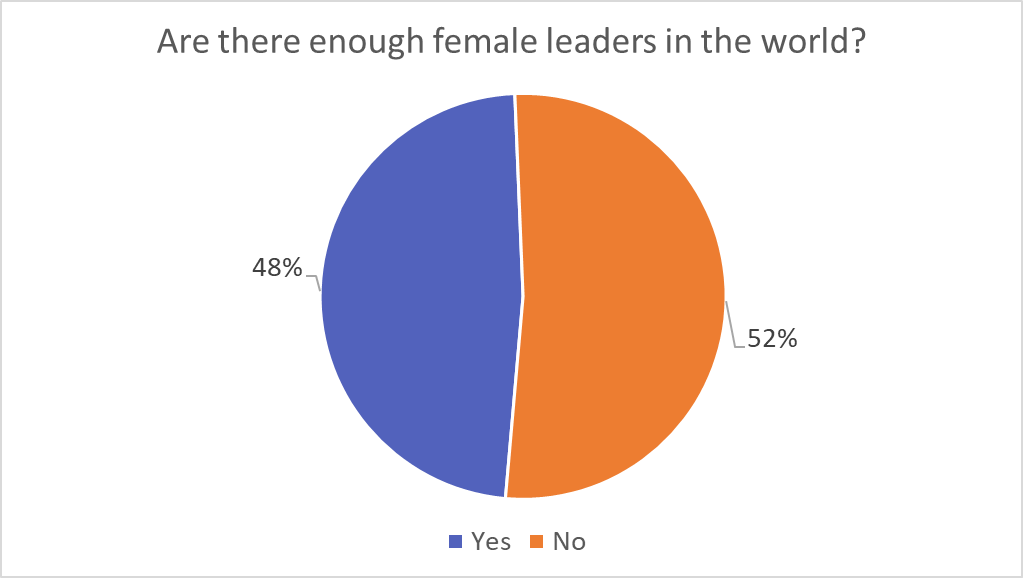
33% of people think that men and women don’t get paid comparably for doing the same job
One question the LifePoints community answered was whether women and men are paid comparably. 33% of people disagreed and said they are not paid comparably.
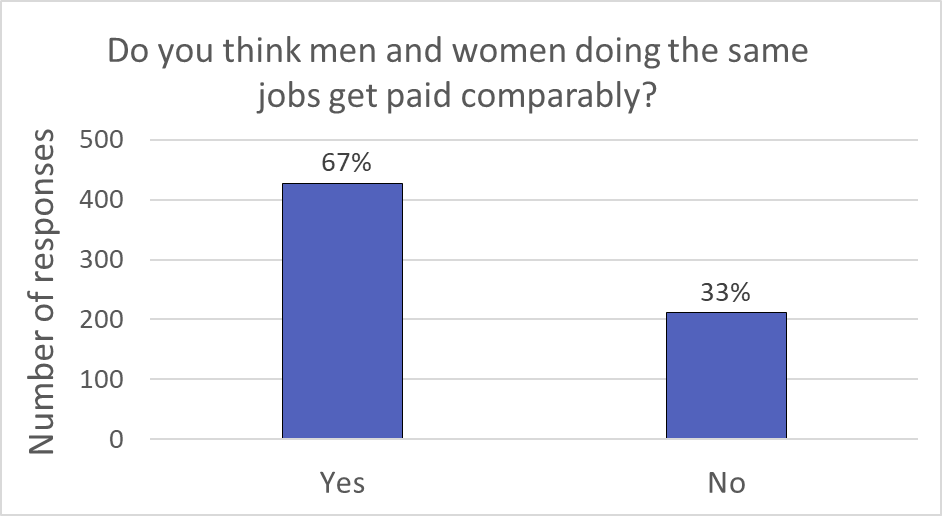
4 out of 5 people think society has progressed and become more equal in the last 10 years
Of all the questions asked, one thing people agreed on was that there has been progress in the last 5 years when it comes to gender equality. 83% of people were in this group.
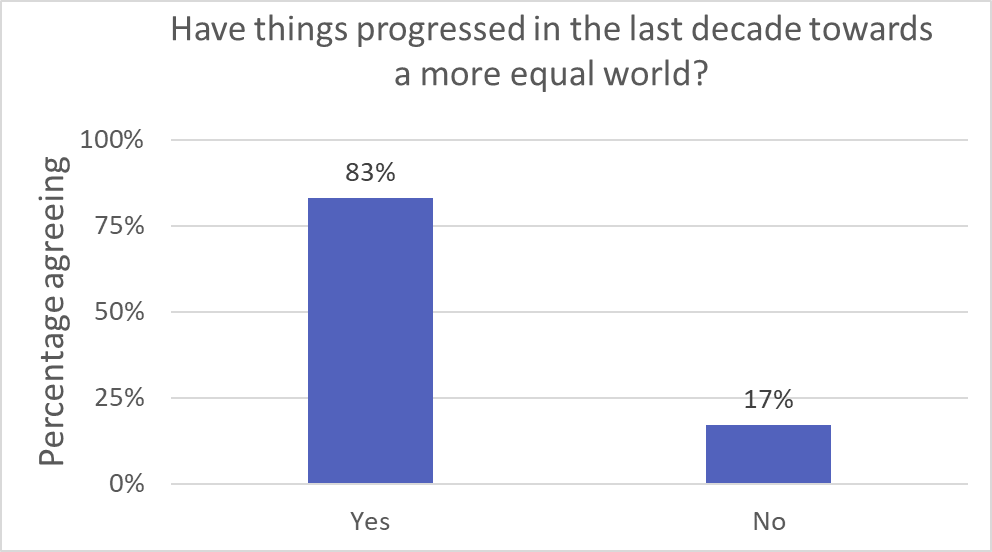
3 successful women to celebrate
The gender pay gap is still a challenge and society needs to see more women in leadership positions. Now is a great chance to celebrate the achievements of some of the UK’s best. From actresses to women in business, these women have achieved a lot.
Emma Walmsley
Emma Walmsley is the CEO of GlaxoSmithKline, known as GSK, which is one of the biggest pharmaceutical companies in the world. During her time at GSK, she has pushed forward a lot of innovations, including treatments for HIV and cancer as well as advances in Gene therapy. For her work, Emma has been named one of Forbes' "World's 100 Most Powerful Women". She was also named the Financial Times’ "Person of the Year" in 2020.
Judi Dench
Judi Dench is one of the UK’s best and most successful actresses. In her 60-year career, Judi has won an Oscar, a Tony, and four BAFTAs. Judi has spent a lot of her spare time advocating for arts education, being a patron of the Royal Shakespeare Company and the National Youth Theatre of Great Britain.
Hayley Parson
Hayley Parsons was born and raised in Cwmbran in Wales and founded GoCompare.com. Go Compare became successful quickly and became one of the UK’s most successful websites, earning over £100 million in revenue per year. For her achievements, Hayley was named the Entrepreneur of the Year at the 2009 Women in Business Awards.
Share your opinions on gender pay gap and many other important matters and get paid at the same time
Gender pay is still an issue with some challenges, and it’s important to have your voice heard on the matter. When you take surveys with LifePoints you get to share your opinion on some of the most important issues such as the gender pay gap. Your views are shared directly with people who make important decisions, which makes surveys a great way for you to participate in the conversation.
For taking surveys, you earn points, called LifePoints, which you can exchange for a reward of your choice. When you’re shopping online for your reward, it’s important to stay safe, so check out our guide on how to shop safely online.
Have your voice heard with LifePoints today
With LifePoints, you can earn points to exchange for gift cards and rewards. Sign up to LifePoints today and you can get 10 free points!
Check out the six benefits of LifePoints blog to learn about all the benefits of joining the community.

